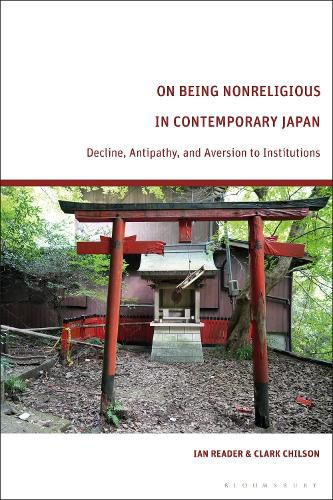Readings Newsletter
Become a Readings Member to make your shopping experience even easier.
Sign in or sign up for free!
You’re not far away from qualifying for FREE standard shipping within Australia
You’ve qualified for FREE standard shipping within Australia
The cart is loading…






Challenging the notion of the nonreligious in Japan being religious through tradition and institution, this book demonstrates how negativity and antipathy for religion relate to religious decline in Japan today.
Although the Japanese say they are nonreligious because they do not identify with a particular religious tradition or institution, they are in fact religious through their traditional practices; New Year's visits to Shinto shrines, Buddhist mortuary rites and festivals (matsuri) are typically seen as customs rather than as religious. This book challenges this answer by arguing that many Japanese say they are nonreligious because they actually dislike religion and want to distance themselves from it.
To support this argument, the book explores how religion is in decline in Japan today. Demonstrating how negative images of religion are produced in the mainstream media, in popular culture, and by various groups and people, this book also explores specific case studies such as anti-cult organizations, lawyers, government agencies, intellectuals, and religious organizations.
Ian Reader and Clark Chilson argue that popular negative images and perceptions about religion create an 'ecology of dislike', which encourages disassociation from religion and exacerbates problems for religions today. Overall, this book provides a new perspective on religion in contemporary Japan that has implications for our understanding of secularization in the modern world.
$9.00 standard shipping within Australia
FREE standard shipping within Australia for orders over $100.00
Express & International shipping calculated at checkout
Challenging the notion of the nonreligious in Japan being religious through tradition and institution, this book demonstrates how negativity and antipathy for religion relate to religious decline in Japan today.
Although the Japanese say they are nonreligious because they do not identify with a particular religious tradition or institution, they are in fact religious through their traditional practices; New Year's visits to Shinto shrines, Buddhist mortuary rites and festivals (matsuri) are typically seen as customs rather than as religious. This book challenges this answer by arguing that many Japanese say they are nonreligious because they actually dislike religion and want to distance themselves from it.
To support this argument, the book explores how religion is in decline in Japan today. Demonstrating how negative images of religion are produced in the mainstream media, in popular culture, and by various groups and people, this book also explores specific case studies such as anti-cult organizations, lawyers, government agencies, intellectuals, and religious organizations.
Ian Reader and Clark Chilson argue that popular negative images and perceptions about religion create an 'ecology of dislike', which encourages disassociation from religion and exacerbates problems for religions today. Overall, this book provides a new perspective on religion in contemporary Japan that has implications for our understanding of secularization in the modern world.